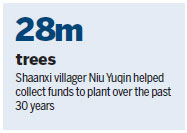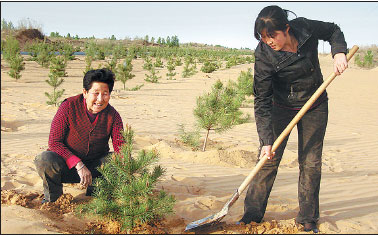Heroine fights the good fight against implacable natural foe
Niu Yuqin, a villager in Shaanxi province's Jingbian county, won the honorary title of "national desertification control hero". The 68-year-old believes fighting desertification should also help local people rid themselves of poverty.
In 1985, Niu and her husband borrowed 4,500 yuan ($689) to plant trees and grass in 440 hectares of desert in Jinjisha village, northwestern Shaanxi province, as part of a contract with the local government.
However the following spring, a sandstorm destroyed all her plants.
Her family had to move to a new house 7.5 kilometers away. They hired 30 workers to plant about 100,000 trees, helping to reverse the desertification process in 667 hectares.

Despite the lack of technology, the onset of illness, as well as stress over financial problems, Niu never gave up her calling.
In over 30 years, Niu collected up to about 8.6 million yuan to restore green land covering 7,333 hectares, where 28 million trees were planted.
"My mother often said desert control should help people here rid themselves of poverty, instead of keeping those who plant trees in debt," said Zhang Liqiang, Niu's third son.
In 1998, Niu opened her own company to develop Chinese herbal medicines as well as an agriculture facility.
After establishing a breeding center in 2008, she began to earn money by selling saplings instead of buying them from others like in the old days.
She then introduced many new technologies. Two biogas digesters were built in a forest zone, the methane from which could be used to heat employees' homes, while the biogas slurry and residue fertilized the plants.
In 2009, a group of experts from Tsinghua University brought their photovoltaic watering system there to save water resources.
The devices combine water-saving irrigation with solar water pumps, to meet the demand for plants in different growing periods.
In 2013, Niu began to cultivate plant species for economic profit, including hazelnut, peony and white bark pine.
Her son, Zhang, said the first group of plants - those that could resist water shortages and had high fertilization rates - turned out to be financially unviable.
But now they are doing experiments to plant more diverse plants, some of which have shown encouraging results. In fact, a total of 13,333 square meters of hazelnut trees have borne fruit.
Niu said she also worked to improve the lives of the villagers.
In the early 1990s, Niu raised 30,000 yuan to build a primary school for the 60 local children.
She then went on to help construct an asphalt road in her village and installed phones and televisions for 380 local families. On top of that were two new classrooms for Dongkeng Middle School.
Niu's center is well on the way to becoming an attraction for visitors, in line with plans made by the Jingbian county government.
Once completed, tourists can experience planting fruit and vegetables, breeding hens, sheep and pigs, as well as the local desert cultural festival.
Niu's inspiring story was filmed in a documentary that was broadcast to the country.
No matter how many awards she wins, however, she has always said: "I'm still a farmer who plants crops and forests to fight desertification."
But she also inspires others, including her own family.
Her son Zhang said, "I decided to go back to the desert after graduation, to help my mother continue her work."
chenmeiling@chinadaily.com.cn
|
Niu Yuqin (left), a villager in Shaanxi, plants a tree with her daughter-in-law. She has inspired her fellow villagers and family members in the fight against desertification and poverty.Provided To China Daily |
(China Daily 09/09/2017 page12)















